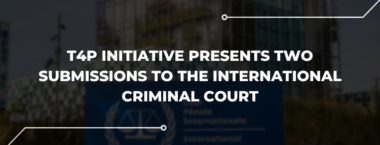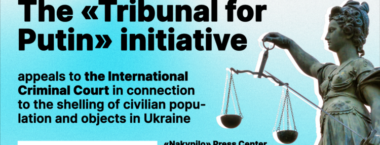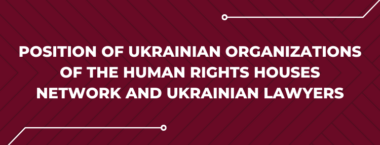
Torments, Torture Chambers, Executions: T4P Initiative Presents Two Submissions to the International Criminal Court
Information about extrajudicial executions of Ukrainians by the Russian military and Russian torture chambers in...
28 September 2023
Principal of rule of law is fundamental. Any civilized society is built on it, it is reflected in the Constitution and international treaties, and need for it observance does not cause any discussion. Judiciary is an instrument through which rule of law is being achieved.
One of the necessary conditions for the implementation of the principal is execution of the court decisions. Existence of judiciary does not have any sense, if its decisions are declarative and are not executed for dozens of years. Responsibility of state is to ensure real implementation of the principal of the rule of law. Otherwise, state cannot demand from its citizens to fulfill their obligations, as far as itself promotes legal nihilism.
If court decision is not obligatory for the state, it means that there is no protection againsе arbitrariness of the public servants and any human rights violation is acceptable.
Currently, state is the most frequent violator. State does not implement court decisions and is debtor in these cases.
This problem existed always since Ukraine gained independence and currently became only aggravated.
European Court for Human Rights (ECtHR) mentioned scope of the problem, when in year 2009 adopted pilot decision Ivanov vs Ukraine. Adoption of the pilot decision underlines drastic violations of the human rights, prescribed by the European Convention for Human Rights (ECHR).
With the pilot decision ECtHR obliged Ukraine to develop plan for extinguishment of debts within the decisions guaranteed by the State and to implement mechanism for its real execution. Besides mentioned above, ECtHR developed principals according to which responsibility for the lack of the execution of the national court decision becomes guaranteed by the state:
– decision of the national court came into power;
Instead of ensuring of the real implementation of the ECtHR recommendations, state formally adopted in year 2012 Law On State Guarantees on Execution of the Court Decisions. The problem rests with the fact, that majority of the state budgetary programs prescribed for the implementation of this law is much less then actual debt.
Currently, debt within the cases, on which state guarantees are extended at least by national law, constitutes more then 31 bln UAH. This does not include different cases which are currently reviewed by the ECtHR, such as debts of Kryvorizh Stal’ and Lukoil, debts of the municipal enterprises and etcetera.
Basically, this amount is constituted from the requests of the ordinary citizens, first of all from marginalized and socially unprotected groups, who for years wait for compensations and, most probably, would never be able to receive them.
During previous years 140 mln UAH were allocated for such compensations and this year – 500 mln. Later means that in order to extinguish the debt, state would need more then 70 years, and only in case of new decisions would not be taken.
Usage of the costs from other budgetary programs or surplus of the costs within one budgetary program is a felony. There are no other programs to address implementation of the plan.
Apparently, there are no guarantees for the fair trial in Ukraine, as far as citizens await for execution of the decisions for years.
The only way to renovate violated rights is application to the ECtHR. Position of the ECtHR towards non-execution of the court decisions is univocal: state is obliged to execute the decisions in accordance to the criteria developed by the Court in the pilot decision Ivanov vs Ukraine.
There is separate budgetary program for the execution of the ECtHR decisions and it has slightly larger budget. Furthermore, in order to avoid the next decision against Ukraine, state often resorts to friendly settlement, in order to avoid payment of the litigation costs, as far as perspectives of the case are often predictable and definitely would not be in the benefit of the state.
All mentioned above was again and again becoming subject for the discussion of the Council of Europe Committee of Ministers. Unfortunately, all the decisions of the Committee have recommendatory character. According to the acting legislation, decisions of the Committee of Ministries are not obligatory for the execution at the national level, contrary to the ECtHR decisions.
It should be noted, that the Ministry of Justice is trying to ensure implementation of the ECtHR decisions, being aware of all negative consequences for Ukraine. That is why this mechanism for the moment is exceptional and only real one.
However, recently practice of pressure of other state bodies, first of all law enforcement, on the Ministry of Justice emerged. The General Prosecutor’s Office and NABU is investigating criminal cases into friendly settlement instances and execution of the ECtHR decisions. Practically, other state authorities try to put the fear on the representatives of the Ministry of Justice, in order to make them to think twice before the friendly settlements and execution of the ECtHR decisions in future. That is how state reenforces its position of the human rights violator.
Under such circumstances, the only way to protect rights of Ukrainian citizens is the application to the ECtHR. Only systematic pressure of this international institution, as well as application of the real measures for the human rights protection, would improve situation and persuade Ukrainian authorities to find the real way out from this situation.
First official letter from the Ministry of Justice of the Ukraine due with mentioned above subject:
Second letter from the Ministry of Justice of the Ukraine:
If you find an error on our site, please select the incorrect text and press ctrl-enter.

Information about extrajudicial executions of Ukrainians by the Russian military and Russian torture chambers in...
28 September 2023

Since the onset of the full-scale invasion, the «Tribunal for Putin» initiative has recorded about...
18 August 2023

Position of Ukrainian organizations of the Human Rights Houses Network and Ukrainian lawyers on the...
17 July 2023

On June 6, 2023, the Southern Area Military Court of Rostov-na-Donu sentenced Mr.Bohdan Ziza, a...
08 June 2023